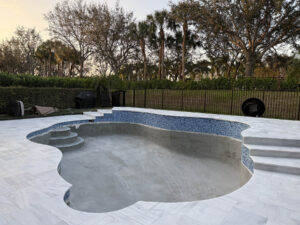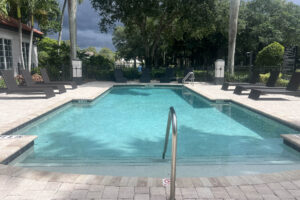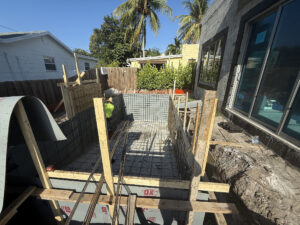Is your pool acting up? Knowing when to call a pool professional can prevent minor issues from turning into major headaches.
Life in West Palm Beach, FL, means sun-soaked days, lush tropical breezes, and, yes, some unique challenges for pool owners. Between the coastal humidity, intense UV exposure, salty sea air, and the occasional tropical storm, your backyard pool faces conditions that most DIY pool maintenance tips don’t prepare you for.
While routine maintenance is manageable for many homeowners, certain red flags should not be ignored. Knowing when to call a pool professional can save you thousands in repairs, extend the life of your pool, and lend you peace of mind.
If you’ve ever wondered when to call a pool professional, this guide breaks down the warning signs to watch for — and when expert help is worth every penny.
Here are 7 signs that it’s time to go beyond the DIY swimming pool maintenance tips and call in an expert to tackle the unique challenges that Palm Beach County homeowners face.
Signal 1: Persistent Algae Growth
Even with weekly brushing and regular chlorine treatments, your pool is a hotspot for algae, especially during Florida’s humid summers. If your pool walls keep turning green or your water gets cloudy, no matter what you do, there’s likely an underlying chemical imbalance or filtration issue.
Why DIY often fails: Standard chlorine and algaecides may temporarily fix the issue, but recurring algae typically signal a deeper problem like poor circulation, imbalanced stabilizers, or underpowered filtration. Most homeowners lack the necessary tools to identify and address these root causes.
What a Pro does differently: A pool technician can conduct in-depth water testing, evaluate circulation performance, and apply commercial-grade algaecides. They may also recommend upgrades to your filtration or suggest changes in chemical stabilizer usage tailored to our UV-heavy environment.
These types of recurring problems are a perfect example of when to call a pool professional rather than relying on DIY pool care.
Signal 2: Your Pool Loses Water Faster Than Usual
While evaporation is normal, especially in Florida’s summer heat, excessive water loss may signal a leak. Cracks in your pool structure, plumbing faults, or deteriorating seals can cause steady, hard-to-detect water loss.
Why DIY often fails: Pool owners usually blame their substantial water loss on evaporation. However, if the water loss surpasses a third of an inch per day, it’s likely a structural or plumbing problem. DIY leak detection is time-consuming, inaccurate, and usually inconclusive.
What a pro does differently: Professionals use pressure testing, dye tests, and sonar tools to locate and fix leaks accurately without guesswork. In Palm Beach, where shifting soil increases the risk of leaks, timely professional intervention can prevent expensive foundation damage.
👉 You can also check out our pool service tips on preventing algae growth during the summer months for more information.
Signal 3: The Water Chemistry Is Impossible to Balance
Ocean water tends to be hard and rich in minerals. Add Florida’s strong UV rays, and chlorine breaks down quickly. Even well-intentioned chemical adjustments can seem to disappear overnight.
Why DIY often fails: Over-relying on test strips or “guesstimating” chemicals can lead to harsh water, eye irritation, or even equipment corrosion. DIYers often miss critical metrics like stabilizer levels or total alkalinity. See pool water chemistry basics.
What a pro does differently: Certified pool pros use digital water testing kits that detect imbalances with high accuracy. They also know how to introduce stabilizers, such as cyanuric acid, to protect chlorine from sunlight and maintain a healthier chemical balance in Florida’s unique conditions.
Signal 4: Your Pool Pump or Filter Sounds Strange (or Stops Working)
Loud rattling, buzzing, or silence from your pump often signals clogs, electrical issues, or motor burnout, especially after lightning-heavy storms common in coastal Florida.
Electrical or mechanical failures are another strong sign of when to call a pool professional before long-term damage occurs.
Why DIY often fails: Flipping the breaker or clearing debris might help in the short term, but doesn’t solve the issue in the long term. If the problem keeps returning, it’s beyond basic maintenance. Opening up pool equipment without proper knowledge can void warranties or make things worse.
What a pro does differently: A technician inspects motor wiring, capacitor health, impeller function, and filter pressure. They can also recalibrate systems damaged by voltage surges, essential in storm-prone areas like West Palm Beach.
Signal 5: Cloudy Water That Won't Clear
Bathers, pollen, or organic debris from Florida’s lush landscape can overwhelm your filter. Humid air and high temperatures further reduce chlorine’s effectiveness, resulting in murky water.
Why DIY often fails: Most homeowners change filters or use clarifiers, but these are short-term fixes. If the sand or cartridge media is old or if the circulation is subpar, cloudiness will persist.
What a pro does differently: Pool pros test turbidity levels and assess filter cycles. Based on the inspection, they may recommend filter media replacement or circulation systems rebalancing. They match treatments to seasonal usage and ensure clarity even during peak swim months.
Signal 6: Cracks in Tiles, Pool Walls, or Decking
Frequent temperature swings, heavy rain, and salt exposure in Palm Beach wear down pool surfaces. Cracks in tiles or plaster can start small but worsen quickly if not sealed. Cracks aren’t just cosmetic. They often signal deeper structural issues or shifting soil, both of which are common in Florida’s coastal zones. Small cracks may allow water to seep into the ground, worsening structural damage over time.
Why DIY often fails: Filling in a crack may sound like a fix, but if you do not check the underlying structure for water loss, the damage may spread underneath. Surface-level repairs can’t stop shifting foundations.
What a pro does differently: A pool technician identifies the cause, whether it’s expansion, soil movement, or material erosion, and then applies structural sealants. They may also suggest resurfacing to prevent deeper issues.
Signal 7: Your Pool Smells Bad or Irritates Skin and Eyes
A strong chlorine smell is usually a sign of chloramines, waste byproducts formed when chlorine combines with organic matter, such as sweat or oils. Florida’s heat and frequent pool use together make this a common issue in Palm Beach, FL.
Why DIY often fails: Shocking the pool without measuring combined chlorine levels can make matters worse. Misbalancing chemicals may increase irritation or damage the liner.
What a pro does differently: Pros calculate combined chlorine, perform breakpoint chlorination, and recommend saltwater systems when needed. They focus on complete sanitization, not just masking the symptoms.
DIY vs. Calling a Pro: What's Worth Doing Yourself?
While some tasks are safe to tackle on your own, there are clear moments when calling a pool professional is the smartest move.
| Issue | DIY Fix | Signal That You Need a Pro |
|---|---|---|
| Green Algae | Brushing + Shock | Keeps returning despite treatment |
| Water Loss | Check for evaporation | Suspected leak, cracks, or underground damage |
| Unbalanced Chemistry | Add chemicals, test strips | Constant imbalance or unclear test results |
| Cloudy Water | Clean filter, add clarifier | Water stays cloudy despite multiple cleanings |
| Equipment Noise/Failure | Reset breaker, clean debris | Pump won’t start, makes loud noises, or overheats |
| Tile/Deck Cracks | Cosmetic touch-ups | Spreading cracks or shifting decking |
| Smell/Eye Irritation | Shock or rebalance water | Recurring discomfort or chemical odor |
Trusted Pool Maintenance Tips for West Palm Beach Homeowners
When it comes to swimming pool care tips, the biggest mistake homeowners make is relying on generalized advice found online. Florida’s conditions are different. Following expert, location-specific pool service tips helps you maintain a safer, more efficient pool year-round. For example, balancing pH during hurricane season or checking salinity levels post-storm are unique to our area.
👉 Visit our post on the benefits of hiring a professional pool cleaner to learn more.
Final Thoughts
Understanding when to call a pool professional is critical for maintaining a safe, efficient, and long-lasting pool.
West Palm Beach homeowners are no strangers to coastal living’s perks and pitfalls. Your pool is the centerpiece of your lifestyle, especially during the long, humid summers in Florida. But local weather and water conditions can turn simple maintenance into a full-time job.
Recognizing these 7 signs early and knowing when to call a pool professional can help you avoid costly repairs, maintain safe swimming conditions, and protect your investment. Whether you’re looking for actionable swimming pool maintenance tips or need help with more complex issues, a certified expert can make all the difference.
If your pool is showing any of these symptoms, don’t wait until it’s too late.
👉 For more insight on how regular expert care can benefit your pool, check out our post on the benefits of professional pool maintenance.
Reach out to a licensed pool professional at Finn’s Pool Service today. Feel free to give us a call for personalized advice.
- Phone: (561) 566-9344
- Email: [email protected]
-
Address: 1335 Old Okeechobee Rd. #450
West Palm Beach, FL 33401 - Mon – Fri: 8:00 AM – 6:00 PM
- Sat & Sun: 9:30 AM – 4:00 PM



